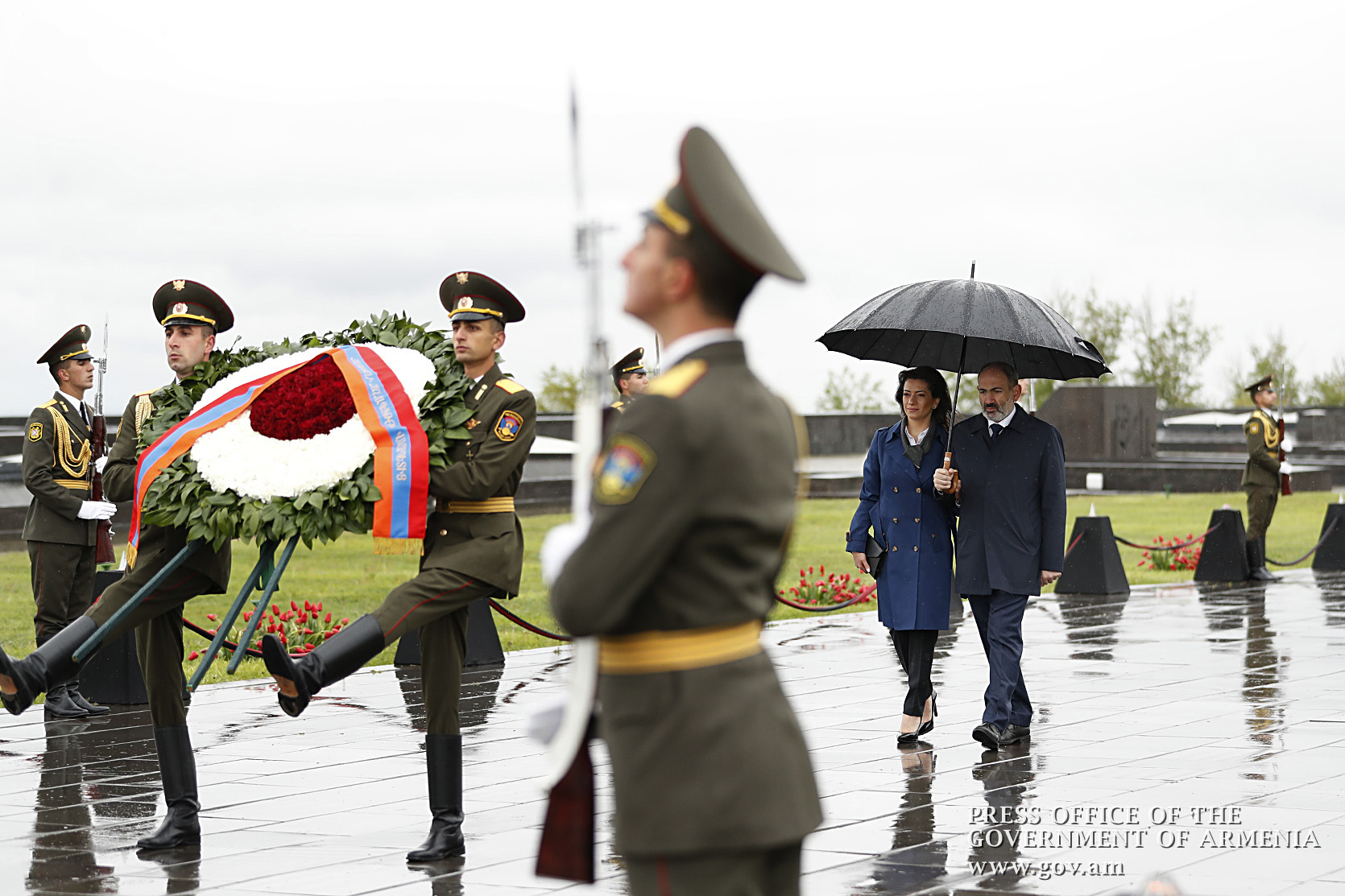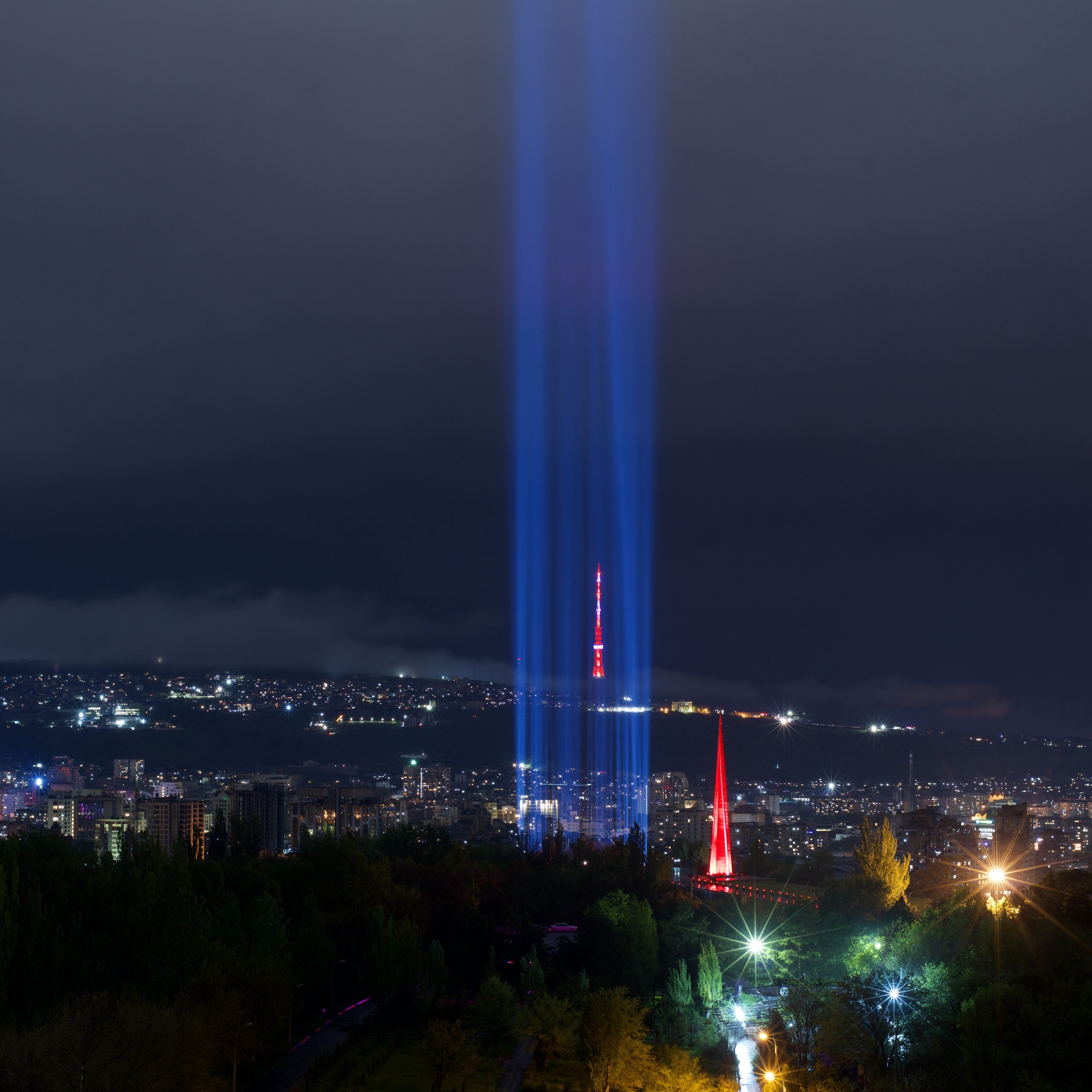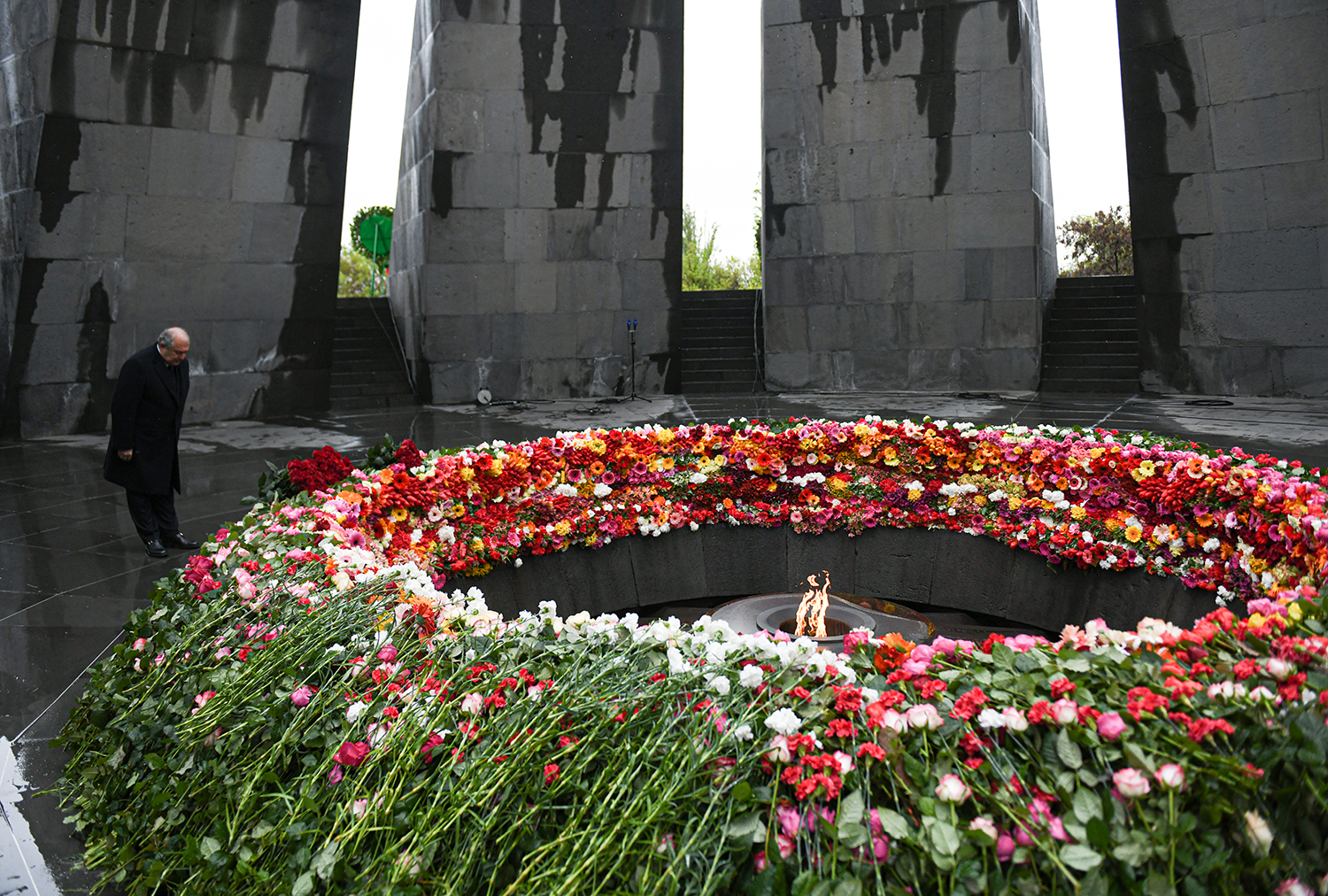 YEREVAN—Armenian Prime Minister Nikol Pashinyan led an official procession at Dzidzernagapert in Yerevan this morning, commemorating the 105th anniversary of the Armenian Genocide with his wife Anna Hakobyan, Armenian President Armen Sarkissian, Catholicos of All Armenians Karekin II and National Assembly president Ararat Mirzoyan.
YEREVAN—Armenian Prime Minister Nikol Pashinyan led an official procession at Dzidzernagapert in Yerevan this morning, commemorating the 105th anniversary of the Armenian Genocide with his wife Anna Hakobyan, Armenian President Armen Sarkissian, Catholicos of All Armenians Karekin II and National Assembly president Ararat Mirzoyan.
Leaders notably kept several feet apart as they left their motorcade and walked past an honor guard under the pouring rain towards the Armenian Genocide memorial in strict observance of social distancing guidelines amid the global COVID-19 pandemic.
The novel coronavirus outbreak, which Armenia has been struggling to contain with some success since mid-March, forced authorities to cancel most of the ceremonies and commemorative events planned for the 105th anniversary of the Genocide this year. In lieu of the traditional torch-lit march customarily held on the eve of the Genocide anniversary, citizens across the country commemorated the somber event in a novel fashion.
The government asked citizens via text message to shut off all their lights at exactly 9:00 PM on April 23rd and stand by their windows with flashlights on for three minutes of silence while church bells tolled across the country. Spotlights placed at the base of the 12 circular slabs—each of which represents the traditional provinces of historical Armenia lost during the Genocide—switched on at that same moment, shooting a royal blue beam of light into the night sky.

In a stark break with tradition, the government procession was not succeeded by an endless flow of mourners as access to the monument was restricted to the general public for the first time in 55 years due to the COVID-19-related lockdown procedures. Instead, an orchestra played a suite of classical and traditional Armenian pieces throughout the day beneath the monument’s imposing spire, which was broadcast live on every television channel and live-streamed on the internet. The Eternal Flame was enveloped by 105,000 flowers in memory of the 1.5 million victims of the Ottoman Government.
Speaking from atop the hill at Dzidzernagapert, the Prime Minister reiterated, “The cause of recognizing the Armenian Genocide is not only a national one, but one of global significance. This was not only a crime against innocent Armenian victims, but a crime against humanity itself.” Yet Pashinyan, flanked by his wife, emphasized that the martyrdom of one and a half million Armenians during the Genocide was not in vain, as it strengthened the will of their descendants to “live, create, regain strength, remember and demand.” He also reminded viewers that many of the challenges that Armenians faced at the onset of the 20th century linger and can only truly be overcome through bolstering Armenian statehood and maintaining dignity through sovereignty.
Tying in this historical grievance with the current situation, Pashinyan praised the solidarity displayed by the Armenian people both within and outside the country in respecting the painful self-isolation protocols, supporting the tireless work of first responders, as well as the technical, material and financial generosity of the Diaspora in overcoming yet another existential crisis. “April 24 has been a symbol of our national unity, consolidation and discipline for many years,” the Prime Minister said before ending the broadcast. “This symbol must be much more powerful, and even more visible today,” he concluded.

President Sarkissian also addressed the nation, calling on the rest of the international community to follow the example of 32 countries in recognizing the Armenian Genocide as a crime against humanity. “It is unacceptable to view the recognition of the Armenian Genocide from the standpoint of momentary economic or political interests related to Ankara,” he deliberated. “We cannot on one hand declare that we are going to fight together against xenophobia, discrimination, intolerance, anti-Semitism, denial and other human vices, and on the other hand ‘play diplomacy’ with Turkey on the Armenian Genocide.” Echoing the Prime Minister, Sarkissian characterized the Genocide as “a story of strong spirit and unbending will.” He described it as a struggle for the preservation of national identity, a struggle for the right to preserve national memory and an opportunity to pass it on to next generations.
French President Emmanuel Macron commented on the solemn occasion as well. In a letter to President Sarkissian, Macron offered his condolences and reiterated the fraternal bonds between the French and Armenian peoples. “Today more than ever, France is committed to protecting the memory of the victims, confronting denial and learning an important lesson from the pages of this tragic history,” read the letter. The National Assembly in Paris also held a moment of silence in honor of the victims.
Home to one of the largest and most influential Armenian communities in Europe, France has been a longtime steadfast supporter of the recognition of the Armenian Genocide. It was one of the first countries in the world to publically recognize the coordinated and premeditated extermination of the Ottoman Armenian population as Genocide in 2001. The country has twice passed bills criminalizing genocide denial in spite of fierce protests from Ankara. Last year, France proclaimed April 24th a day of national commemoration of the Armenian Genocide.
The current lockdown measures have presented annual commemoration organizers with an unlikely opportunity to participate in events on equal footing through what Armenians are best known for: technology. Aside from the countless live programming streaming from Armenian homes, those willing to participate have been asked to text their names to the number 1915 in Armenia and +37433191500 internationally. Names are being projected onto the walls of Dzidzernagapert as of 10:00 PM Yerevan time as part of what the Prime Minister has dubbed the “Virtual March” for the memories of the victims. The projections will be displayed continuously until dawn.


Thanks Raffi for choosing to live in Armenia and giving us insightful reports on the state of Armenia.